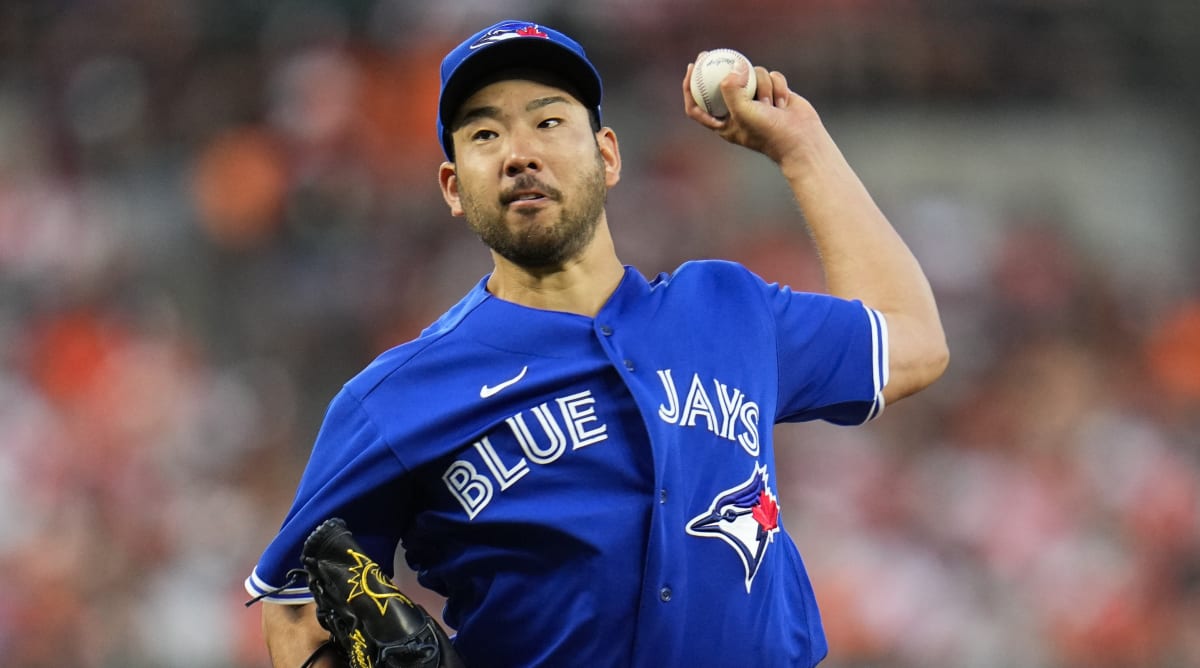NEW YORK — In retrospect, maybe Yusei Kikuchi should not have mentioned the sleep thing, because now his fellow Blue Jays won’t let it go. But he seems bewildered by the attention. No, he wasn’t really joking when he attributed his early exit in Tuesday’s win over the Yankees to left trapezius cramping from a poor night of sleep: He only got 11 hours. He prefers 13 or 14.
“My teammates asked me how I'm able to sleep so much,” he says through interpreter Yusuke Oshima. “But, like, honestly, if you close your eyes, I feel like you should be able to sleep.”
It typically takes Kikuchi about five minutes to nod off, and he begins his bedtime process with 10 minutes of meditation. He does not need fancy accouterments or especially dark rooms, although he has become fond of a pillow he ordered on Amazon. He says he would consider an endorsement deal with a mattress company.

Julio Cortez/AP
Kikuchi says he has been a good sleeper since he was a boy growing up in Iwate Prefecture, Japan. “Just naturally,” he says in English. He adds that he only needs 14 hours before his starts—on other days he’s happy to settle for “eight, nine, 10” hours.
Those numbers are fairly standard for major leaguers these days, who have been hearing about the merits of sleep hygiene for years. A 2013 Gallup poll found that the average American gets only about 6.8 hours of sleep per night, less than the seven to nine hours most doctors recommend. But for athletes, who track every bodily input and output with precision, restorative sleep offers a competitive advantage. In ’18, Astros ace Justin Verlander admonished third baseman Alex Bregman for getting only six hours and encouraged him to shoot for 10. In some ways they were late to the trend: In ’12, LeBron James and Roger Federer said they were getting 12 hours.
But playing 162 games in 185 days, often flying across three time zones and sometimes slogging through a day game after a night game all makes that difficult. Kikuchi aims to get to bed around 11 p.m. each night and wake up at 1 p.m., just in time to head to the ballpark. (It must also be mentioned that Kikuchi has a four-year-old son, Leo, which means that the hero of this story is really his wife, Rumi.) But if Kikuchi can’t get his full rest in one go—on many travel days he ends up with more like six hours straight—he tries to piece it together. Teammates laugh as they describe him passed out on the plane and the bus.
“I've seen him sleeping in the middle of a clubhouse with music on,” says reliever Tim Mayza, with awe in his voice. (Mayza, who has a 2-year-old and a 10-month old, shoots for nine hours of sleep but doesn’t always get there. “My wife is a saint,” he says.) Kikuchi explains in English that he prefers to use the stadium’s recovery room for a daily “power nap” of 10 minutes. But if someone else is in there, he just straps on an eye mask and leans back in the office chair at his locker. The noise does not seem to affect him.
“He could sleep through this,” says outfielder Daulton Varsho, as Rick Ross’s “Hustlin’” drowns out his words. (Varsho aims for eight or nine hours.) “It’s incredible. I wish I had that superpower.”
Here Kikuchi does permit himself to acknowledge that he is unusual. “I can sleep anywhere, anytime, anyplace,” he says through Oshima.
“It’s definitely unorthodox,” says righty Chris Bassitt, who says he gets “anywhere from six to eight” hours a night, but it’s hard to argue with the results: Kikuchi has started 30 games, sixth-most in the American League, and struck out 9.6 batters per nine innings, eighth among AL starters.
Manager John Schneider says the Blue Jays take sleep hygiene seriously, sometimes delaying a flight until the morning after a series ends so that players can get a full night of rest. “Off the top of my head, I do not know the exact baseline number [that we recommend],” he says. “I know that I am not achieving it.” He grins and says the last time he got 13 hours of sleep was “when I was 13 years old.”
And still, all this sleep is not quite enough to keep Kikuchi awake: He is also an avid coffee drinker. “Addict,” he says in English, laughing. Then he trots off, presumably to take a nap.







